
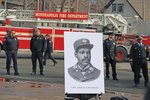
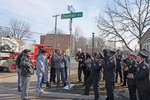

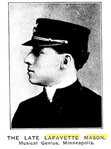
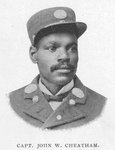
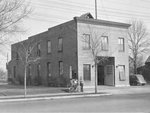
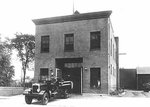
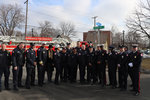
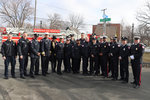
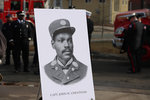
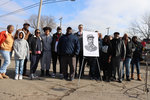
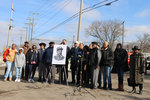

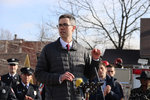
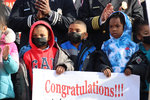
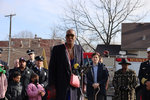
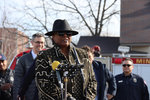
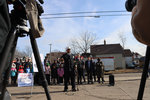
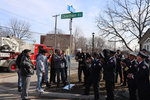
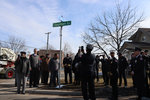
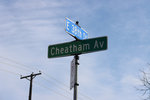
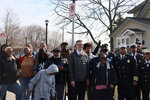
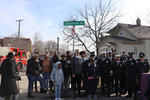
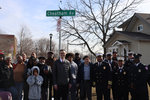


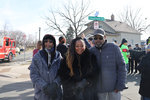
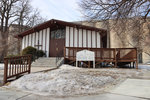
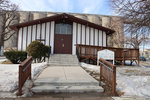
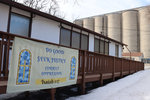
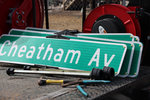
Listen to speakers Ward 12 Council Member Andrew Johnson; council member Andrea Jenkins; former Fourth Judicial Judge LaJune Lange; and Minneapolis Fire Chief Bryan Tyner.
Dight Ave is no longer named after a man who launched a crusade to bring the eugenics movement to Minnesota and wrote fan letters to Hitler. Instead, it has been renamed to honor John Cheatham, a man born a slave who served as the city’s first Black fire captain.
A ceremony was held on March 17, 2022 at 38th Street and Cheatham Avenue to mark the name change. Members of his family, many of whom still live in the neighborhood, were present.
Lifetime Longfellow resident Tammy Crockett said, “It was awesome” to see the new name be unveiled, honoring her great-great-great-great uncle.
Her grandson, 11-year-old Levonte Stephens, helped during the ceremony when the new name was unveiled from behind the old one. “It was fun to pull the rope off,” he said.
Crockett lives a few blocks away from the renamed street, and can point to the homes her relatives have lived in nearby over the decades since John Cheatham’s parents chose to settle in Minneapolis. They left Missouri after the Emancipation Proclamation when John was eight. Crocket said she didn’t know much about John Cheatham until she received a call as genealogists worked to track his descendants down. Then she started researching him - and Charles Dight whom the street was named after previously. Her grandchildren attend Friendship Academy of the Arts down the street (3320 E. 41st St.), and she feels proud to know they will be on a street named after their family member.
“It’s nice to have history and be a part of it,” stated Caprice Stephens, who bought her grandparent’s house a few blocks away.
This street name is “a recognition of my connection,” said Crockett. “It makes me feel more connected.”
John and his wife, Susie, lived at 3020 20th Ave. in Corcoran and their four children attended South High School. He worked at Fire Station #24, a station built in 1907 at 45th and Hiawatha to house the city’s Black firefighters and to support the station at Minnehaha and E. Lake Street (now the home of Hook & Ladder Theater & Lounge). The station was closed in 1941 and transitioned to private ownership and industrial use.
Many forgot about its first use. Much of the history of the station was lost until former Fourth Judicial Judge LaJune Lange heard about it from an elder, and began working to pinpoint its location. It took her two years, but she worked with the city to have the building at 4501 Hiawatha designated a historic structure in January 2022. It is currently occupied by Adventures in Cardboard, and still has the original lockers.
Start of reconciliation for St. James AME
St. James AME Church (3600 Snelling) has been asking the city to rename Dight for over a decade. The church sits between Dight and Snelling, and has for 107 years. Half of the church’s 85 members live in the neighborhood and half live elsewhere. Throughout the years, the relatives of John Cheatham, the Websters (who lived at Snelling and 36th), McIntoshes, and McDavies, have attended the church.
St. James AME Reverend Dr. Tracey Gibson said, “It’s progress, and we have a long way to go. It’s healing.” She added that it is the start of reconciliation.
“It’s the mosaic of the community coalescing once again. The mosaic that is the Longfellow community is coming back together,” said longtime church member and leader Stephen Dye.
Church historian Larry Burt stated, “It’s a relief to go from villain to hero. It’s a great change and a relief that’s not attached to our church anymore.”
The church had originally suggested the 10-block stretch that runs south from 34th to 44th be renamed to recognize Rev. Noah Smith, who pastored there for about 25 years ago and is one of the “foundational stones in our community,” said Dye.
‘It’s a good day’
“I cannot emphasize enough, Charles Dight does not and has not and will never reflect the values of this community,“ said Ward 12 Minneapolis Council Member and Longfellow resident Andrew Johnson.
“It’s a good day because we’re taking that name down. But it’s a better day because of the name we are putting up. Captain John Cheatham stood up at a time when he faced tremendous racism and oppression to serve this community with honor and to protect the residents of this community. He truly is a name we should drive by, walk by, and see lifted high above us not just to lift up his legacy but as an example of how we should act and how we should move forward in this world.”
“What we’re doing is writing history the way it should have been written,” remarked Mayor Jacob Frey.
“We are lifting up the name of John Cheatham,” observed Andrea Jenkins, the first Black transgender city council president.
Minneapolis Fire Chief Bryan Tyner, the city’s second Black chief, observed, “I know I stand on the shoulders of those who came before me.”
He pointed out that after John Cheatham, there were no other Black captains in the Minneapolis Fire Department until the 1990s. Along with other members of the African American Firefighters Association, Tyner stated that he works to help those who come up behind him. “Continuing that tradition, continuing that progress is what I will strive to do,” he said. “I’m just so happy to see this day finally here.”
Effort of collaboration
John Cheatham’s relatives were present thanks in part to the work of researchers Cindy Lindau and Robin Macgregor, of the Minnesota Genealogy Society. Lindau learned about Cheatham after reading a column written by Jennifer Brooks in the Star Tribune that mentioned a search for his relatives. She thought, “I can help with that.”
The search took a long time, in part, because they were working backwards. Typically, genealogists start with the now and work backwards. With this case, they started backwards with John Cheatham and sought to move forward.
“It truly is an effort of collaboration,” observed Lange.
She added, “The city of Minneapolis did something very important. They gave a descendant of an enslaved family a living wage job that he could buy a home, settle in the city, make a contribution to his community, and live and earn the respect of others. Living wage jobs must continue. Single family housing must continue. And I hope that you can join me as we continue to work to uncover the stories of so many African-descendant people in the Longfellow community.”
New Minneapolis Public Works Director Margaret Anderson Kelliher said she looks forward to working with residents on projects like this.
Coming next may be the renaming of Edmund Boulevard, a 10-block section adjacent to West River Parkway that honors a Longfellow developer who wrote the first covenant restrictions blocking people of color from buying property in Minneapolis.
Comments
No comments on this item Please log in to comment by clicking here